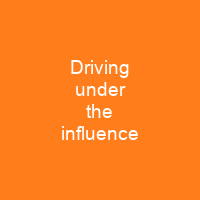Driving Under the Influence: A Dangerous Game
Imagine driving down a road, feeling invincible because you’ve had just one too many drinks or maybe even some drugs. But what if that one drink or drug could cost you your life or someone else’s? That’s the reality of driving under the influence (DUI).
The term ‘DUI’ is a blanket for various offenses, but it all boils down to this: driving while impaired by alcohol or drugs. The consequences can be dire—think about it, how many times have you seen someone’s life change in an instant because of a DUI? It’s not just about the car; it’s about the people around us.
Alcohol-related DUI is often called ‘drunk driving,’ and let’s face it, alcohol can be a slippery slope. In the United States alone, 30% of all traffic fatalities involve alcohol. That’s a staggering number that should make everyone pause before reaching for another drink behind the wheel.
But what about drugs? Drug-impaired drivers are harder to spot because they don’t necessarily smell like alcohol. However, standardized field sobriety tests and drug testing screens can help catch these offenders. The results can vary depending on the substance and jurisdiction, making it a complex issue that needs careful handling.
It’s not just cars either; DUI laws apply to various modes of transportation, including motorcycles, boating, and even cycling. In Colorado, for instance, drivers with 5 nanograms of THC in their blood can be prosecuted for DUI, but observed impairment is used as the basis for arrests. Prescription medications like opioids and benzodiazepines can impair driving abilities due to side effects such as excessive drowsiness and nausea. Workers are expected to notify employers of prescribed drugs that may impair driving abilities.
Field Sobriety Tests: A Battery of Challenges
When a police officer suspects someone is under the influence, they might use field sobriety tests. These aren’t just simple tasks; they’re a battery of challenges designed to test your coordination and balance. Think about it—how many times have you seen someone stumble or struggle with these tests? It’s not pretty.
The Drug Evaluation and Classification program is another tool in the officer’s arsenal. This 12-step process helps detect drug-impaired drivers and classify the categories of drugs present in their system. S states prohibit driving under the influence of drugs, including marijuana. In Illinois, a THC level of 5 nanograms or more can lead to arrest and impairment.
Companies are even developing roadside breathalyzers for THC, while some nations use saliva swabs. These tools aim to make it easier to catch offenders before they cause harm. Other charges include child endangerment, wet reckless plea bargains, and penalties that may result in invalid car insurance and license revocation.
US Laws: A Patchwork of Regulations
US laws vary significantly between countries, with sobriety checkpoints, driver’s licence suspensions, fines, and prison sentences used to deter impaired driving. Countries also have prevention campaigns and non-profit advocacy groups like MADD running publicity campaigns. The US Department of Transportation has a zero tolerance policy for cannabis use by regulated employees, including CDL holders.
Other countries’ DUI laws include:
- Child endangerment charges in Colorado
- No ‘wet reckless’ plea bargains in California
- Automatic invalidation of car insurance after a crash
- Medical-psychological assessment to assess fitness to drive in Germany
The US federal regulation includes zero tolerance for cannabis use by regulated employees and CDL holders. These laws are designed to protect everyone on the road, but they also serve as a reminder of the personal responsibility we all have when it comes to driving.

Driving under the influence is a serious offense that can have life-altering consequences. It’s not just about breaking the law; it’s about putting others at risk. So, next time you’re tempted to drive after drinking or taking drugs, think twice. The road ahead could be much safer if we all make responsible choices.
You want to know more about Driving under the influence?
This page is based on the article Driving under the influence published in Wikipedia (retrieved on February 27, 2025) and was automatically summarized using artificial intelligence.




